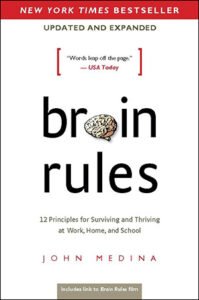|

|
Brain Rules:
A business of the future takes sleep schedules seriously.
|
053 |
|

|
Brain Rules:
People vary in how much sleep they need and when they prefer to get it, but the biological drive for an afternoon nap is universal.
|
055 |
|

|
Brain Rules:
Loss of sleep hurts attention, executive function, working memory, mood, quantitative skills, logical reasoning, and even motor dexterity.
|
055 |
|

|
Brain Rules:
…research shows that memories of stressful experiences are formed almost instantaneously in the human brain, and they can be recalled very quickly during times of crisis.
|
065 |
|

|
Brain Rules:
In almost every way it can be tested, chronic stress hurts our ability to learn.
|
065 |
|

|
Brain Rules:
Relationships matter when attempting to teach human beings – whether you’re a parent, teacher, boss, or peer… But its success is fully dependent upon feelings.
|
066 |
|

|
Brain Rules:
Studies show that a certain amount of uncertainty can be good for productivity, especially for bright, motivated employees.
|
075 |
|

|
Brain Rules:
The brain acts like a muscle: The more activity you do, the larger and more complex it can become.
|
087 |
|

|
Brain Rules:
Emotionally charged events are better remembered – for longer, and with more accuracy – than neutral events.
|
112 |
|

|
Brain Rules:
…certain emotionally charged events are universal, capable of capturing the attention of all of us.
|
113 |











